|
Listen to the episode using the above player or by clicking the link to your preferred podcast platform below:
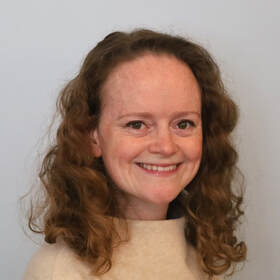
Emma Siesfeld has spent the last 10 years in public education as a teacher, coach, and administrator as well as designing and implementing support for students with disabilities that promote skill growth and independence. Dreams for education How do we support all students to be motivated, engaged, and develop their skills for success? When asked about the big dreams Emma holds for the field of education, she replies that she wants education to feel empowering to students. She wants students to feel like their voices matter and whatever they contribute is valued. Emma believes that learning can be fun and engaging to students. We just have to make sure we are caring enough as educators to make it different. As a teacher, one of our biggest goals is to make sure students feel prepared and ready for the future. Students would ideally make progress every day with the tools they’re given and come out feeling powerful in their lives and the world. Taking direction from students and their communities Emma discusses how in our standard teacher training, we take what has traditionally worked for us and then when it comes time to teach, we sort of take that same model and apply it to our students expecting it to work for them. But there are many students who will struggle with your methods because they have different learning obstacles and strengths than you. So, we have to be willing to pay attention to these needs and honor the child in that way. Another way to change our mindset is to not think of students learning when they want to. Instead what if it’s students learn when they can? This brings in a responsibility to teachers and school leaders to figure out how we can make the school setting and the learning more equitable for students who are underrepresented. “I think there are a lot of ways in which we are not fully in control...to make sure students get what they need, but certainly, looking at what we have within our roles and trying to figure out and identify exactly what we can do to really support students so that they're in a place where they can learn.” Strategies to support all students It can be scary to experiment with new methods. Changing the model can feel uncomfortable but Emma shares that it just comes down to being more open and courageous for the sake of a supportive learning environment and for student growth. Remind yourself that it’s okay to stumble or to not get it right when trying new ways. You don’t have to be perfect about it! To help yourself make the journey easier, be open to transparency with your students and even their parents if that helps. This encourages social emotional skills that we want students to learn as well. Another thing you can do is talk with peers and coworkers. Share your feelings around those challenges and ask for some advice on strategies that they might have tried in the past. You’re likely to get a lot of encouragement and new ideas by opening up about it. One key strategy Emma reveals is partnering up with parents so that they can make sure everyone's on the same page with knowing what that student/child needs to be supported by the school and parent. To hear Emma walk me through several strategies from her amazing guide, listen to the episode, and feel free to share what what strategies resonate with you! To continue the conversation, you can head over to our Time for Teachership Facebook group and join our community of educational visionaries. Until next time leaders, continue to think big, act brave, and be your best self.
0 Comments
Listen to the episode using the above player or by clicking the link to your preferred podcast platform below:
What do you do when facts don't seem to matter? One of the most common questions I get when facilitating with teachers and district leaders is how do I teach for justice without feeling like I’m indoctrinating my students? There’s a line that teachers and leaders want to walk, afraid to go too far into radical ideas. There’s also the point that the facts are always being put up for debate. Dr. Ayo Magwood’s article goes over how to have a historical, scientific approach to anti-racist education. She says “I do not allow classroom debate over whether structural racism exists. As Hess and McAvoy (2104) argue ‘That is inauthentic and problematic to allow students to debate settled empirical questions,’”. She is stating some questions have factual answers. Then there are policy questions which are debatable because they are a matter of opinion on how certain factual issues should be handled. Making these distinctions are a way for us to be able to hold important discussions while the facts remain important. Perspectives Consciousness Approach The other piece of this is that you should be teaching the history and sociology on these empirical topics but when it comes to the debatable parts, you might want to take a perspectives consciousness approach. This approach was made by Robert Hanvey in 1976. It centers on how we all have different views and that’s because our positionality is so varied. The intersection of our different identities is what influences our perceptions of various issues. Seek out the perspectives of multiple people instead of taking your perspective as the universal one. We see this happen with both children and adults. There’s this ‘If I didn’t see it happen or if I didn’t experience it, then it didn’t happen’ type of mentality. “This is something that is applied to the policy solution question; It's not applied to a factual question or an empirical question because then we run the risk of universalizing our personal perspectives. If we say ‘this is my truth and therefore it is fact, it is true for everyone’, that becomes problematic.” Truth decay Another helpful resource is Dr. Jon Wegin’s book, “Deep Learning in a Disorienting World”. The author explains the importance of deep learning and how to take steps towards that. One of the terms in his book is “truth decay”. Truth decay has been found to be caused by the following:
“What we're trying to do is to motivate students to latch on to that emotional piece and support action, the motivation to complete the worksheet or to complete the project or to apply the skills, whatever it is, but that emotion is really critical.” This kind of discourse thrives with equal parts challenge and confidence. We don’t want students getting too frustrated with challenges but just enough that they are able to figure it out. We also want confidence so that students are motivated to keep trying even if they don’t have success the first few times. All of these main points from each author can be practiced by students, teachers, family members, etc in order to build more capacity for discourse that challenges, transforms and promotes racial justice. To continue the conversation, you can head over to our Time for Teachership Facebook group and join our community of educational visionaries. Until next time leaders, continue to think big, act brave, and be your best self.
Listen to the episode using the above player or by clicking the link to your preferred podcast platform below:
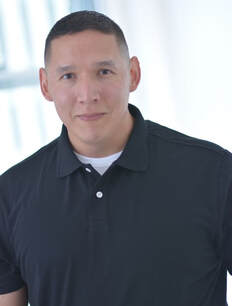
Dr. John Littlewolf grew up in the city of Cass Lake on the Leech Lake Indian Reservation of Ojibwe, one of six bands comprising the Minnesota Chippewa Tribe. He began his law enforcement career with the white earth tribal police in 2009. During his career, his positions included patrol officer, domestic violence and sexual assault investigator, and criminal investigator. He’s currently a conservation officer. He holds a Bachelors in Criminal Justice, a Masters in Public Safety Executive Leadership, Masters in Leadership & Change, and a PHD in Leadership & Change. John has always been an advocate for his Indigenous community. John is also a published author of a book of brilliant poetry and a self described activist. What does poetry do for us? Poetry has the power to reveal the common emotions and experiences that a group of people go through. Take John’s poetry for instance. His poetry teaches us about resistance, ancestral wisdom, fighting for freedom, and more. When talking about his start with poetry, Dr. Littlewolf connects poetry to his early life experiences. It was a way to process the emotions and thoughts that came up days later. He sees it as a gift that will remain a part of him no matter what. “For me poetry is...It was always there. it was this underlying river, if you will. It was always there in my experiences. It would be delayed. So I would go through something, whether it be loss or an experience and days later, what I believe was my consciousness, or my spirit, was putting it together...and days later, it would become something I never expected. Some of them, I look at them like oh my God did I write that?” No need for rules Being able to transmit emotion across space and time is a necessary part of the work to fight for justice and celebrate Indigenous culture according to Dr. Littlewolf. He shares that being able to feel these intense emotions after reading something by a poet was what inspired him in the first place. He wished that in his school, he could have been introduced to it sooner. Reading and writing minus all the rules and the standards removes the barriers that may inhibit students from writing for expression, creativity, and growth. “Nobody told me that you could take away the rules. You could just write what you feel and you don't have to write in a box. I didn't discover that until I was 26. And I wish I had discovered it sooner. I wish there would have been a teacher or a mentor or something along the way there.” How poetry connects with identity and activism Oftentimes, where poetry and activism intersect is right alongside identity. The things you may fight for or against are usually something that affects you to your core. So being able to translate those feelings into words can be therapeutic and helpful to your own activism. Not to mention, as a teacher, it’s a way of understanding where your students are coming from. If you used it to say I would like you to write down what you're feeling right now, that could make a real difference in teacher-student relationships as opposed to making assumptions about why certain students are behaving a certain way. John mentions how much it uplifts him to see the younger generations in his Ojibwe community achieving more and more success each year. These celebrations and the ability of Indigenous populations to overcome the deeply rooted effects of settler colonialism and violence are what current and future generations need to know about. So the writing continues. Of course, the barriers are still there. The U.S. still fails to meet the demands being made for justice. And so once again, the writing will continue. To continue the conversation, you can head over to our Time for Teachership Facebook group and join our community of educational visionaries. Until next time leaders, continue to think big, act brave, and be your best self.
Listen to the episode using the above player or by clicking the link to your preferred podcast platform below:
Do you ever come across an exciting resource that would be perfect for your teachers’ professional development but don’t know if you have enough in the school budget to invest in it? Today, I’m going to help you find multiple ways of funding your PD or your teachers' PD so that they can create engaging class experiences for students and you can be your best leader self. Looking at Title I If you’re a new administrator or starting to look through all of the new funding you’ve been given this year, it’s time to consider how you can get the money needed for PD. First off, Title I and Title II are the most common sources for funding professional development. Here are examples of what Title I funding can be used for:
“Providing greater decision making authority and flexibility to schools and teachers in exchange for greater responsibility for student performance.” This is where survey tools would be useful for being able to assess student/teacher/family experience. You can also use this funding to build the foundation for making shared decisions and leading in collaboration with school stakeholders. This will set your school up for sustainable success beyond one year. The research shows that this type of model which puts together multiple stakeholder viewpoints, leads us to making better decisions. Another purpose of Title I is that it should be used to elevate the quality of instruction. This could be achieved through collaboration and group coaching programs. On to Title II Title II funding can be used for:
Teacher mentoring could be a great way to get to the last point of hiring and retaining those teachers and principals with excellent skills. When we talk about studying data, I encourage you to go past the numerical data and look at perception data as well. There is definitely an emphasis on leader PD here, so use it well! Bonus: Title IV Title IV is one of the lesser known options for professional development. Just a note that this can’t be used for substitutes who aren’t attending PD that is funded through Title IV. Title IV allows uses of funds for:
“If we are in spaces, where we are trying to foster a school community that is antiracist, that advances intersection of justice, yes, we will likely decrease bullying, we will likely increase relationship building...All of these are kind of outcomes of programs that develop and facilitate generative conversations about race and anti racist policy and having an anti racist class culture. So, I think that's not explicitly named here but any programming, any professional development around this, is going to contribute to all of these outcomes that are listed in the language.” Don't forget about ESSER funding ESSER funding is the last option I’m going to name. This is relevant to COVID as it stands for Elementary and Secondary School Emergency Relief. There are actually three different subsections under this but they all have some overlap. All three types of ESSERs can be used for planning and implementing summer learning, providing mental health services and supports, and activities that address the unique needs of students who have been historically underserved by school systems. ESSER I and ESSER CARES can be used for principals and leaders to address school specific needs. This can cover many things like raising capacity for leaders to advance student achievement. ESSER II and ARP ESSER can be used to adjust learning loss among all students in all subgroups and administer high quality reliable assessments. Project based learning, what I teach in my PD programs, is one of the best ways to have students show that they are retaining the information they’re learning and getting high quality skills from it. You can use this funding for contracts in the upcoming school years so you have a sustainable runway for ongoing, quality professional development. So, invest wisely, and don't let that money go to waste! I hope this was a helpful, comprehensive guide for you on how you can pay for your teachers PD or your own. Be sure to take advantage of the unique funding that schools have received this year and last, due to COVID, so your school can thrive from that much needed PD. To continue the conversation, you can head over to our Time for Teachership Facebook group and join our community of educational visionaries. Until next time leaders, continue to think big, act brave, and be your best self. |
Details
For transcripts of episodes (and the option to search for terms in transcripts), click here!
Time for Teachership is now a proud member of the...AuthorLindsay Lyons (she/her) is an educational justice coach who works with teachers and school leaders to inspire educational innovation for racial and gender justice, design curricula grounded in student voice, and build capacity for shared leadership. Lindsay taught in NYC public schools, holds a PhD in Leadership and Change, and is the founder of the educational blog and podcast, Time for Teachership. Archives
May 2024
Categories |
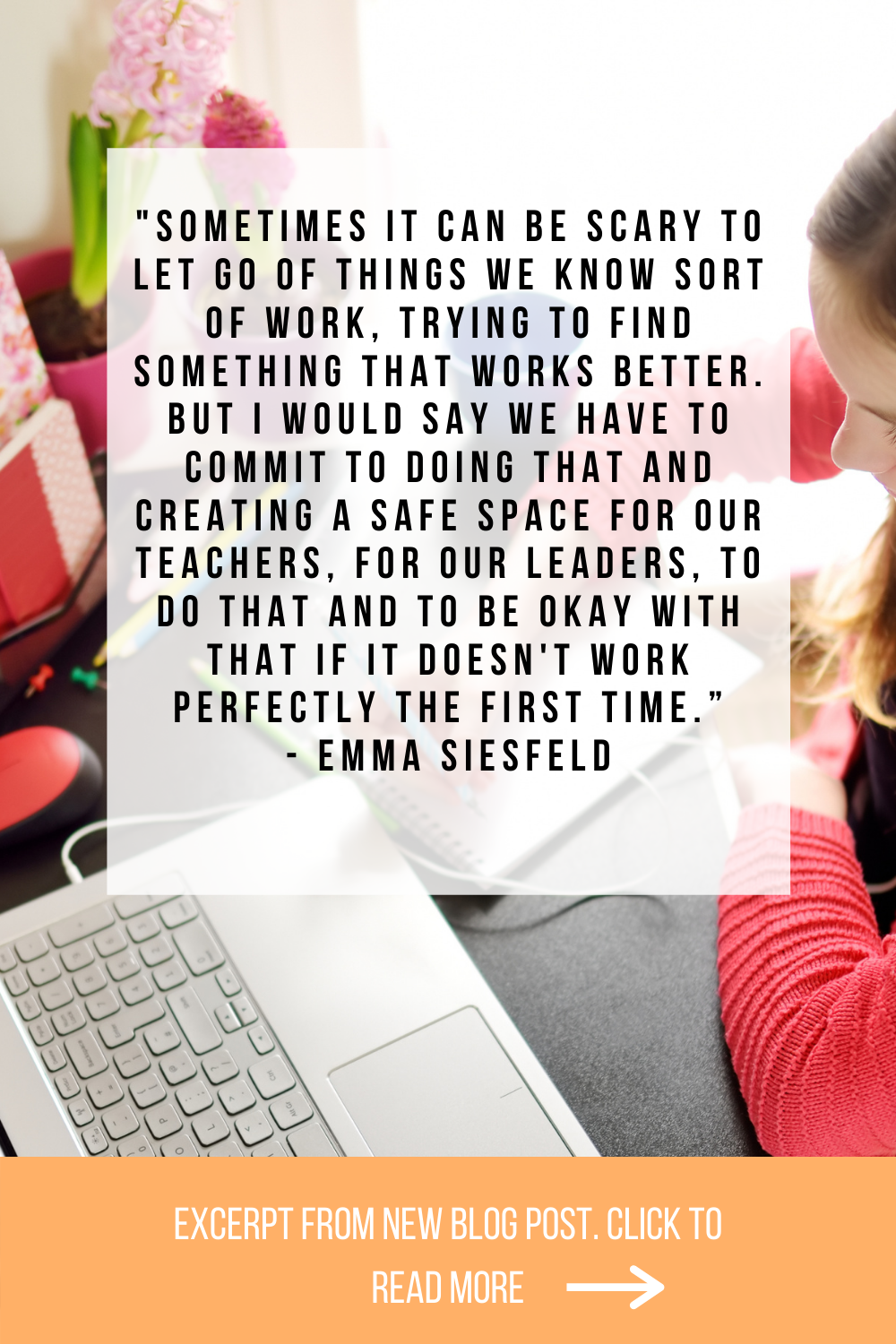
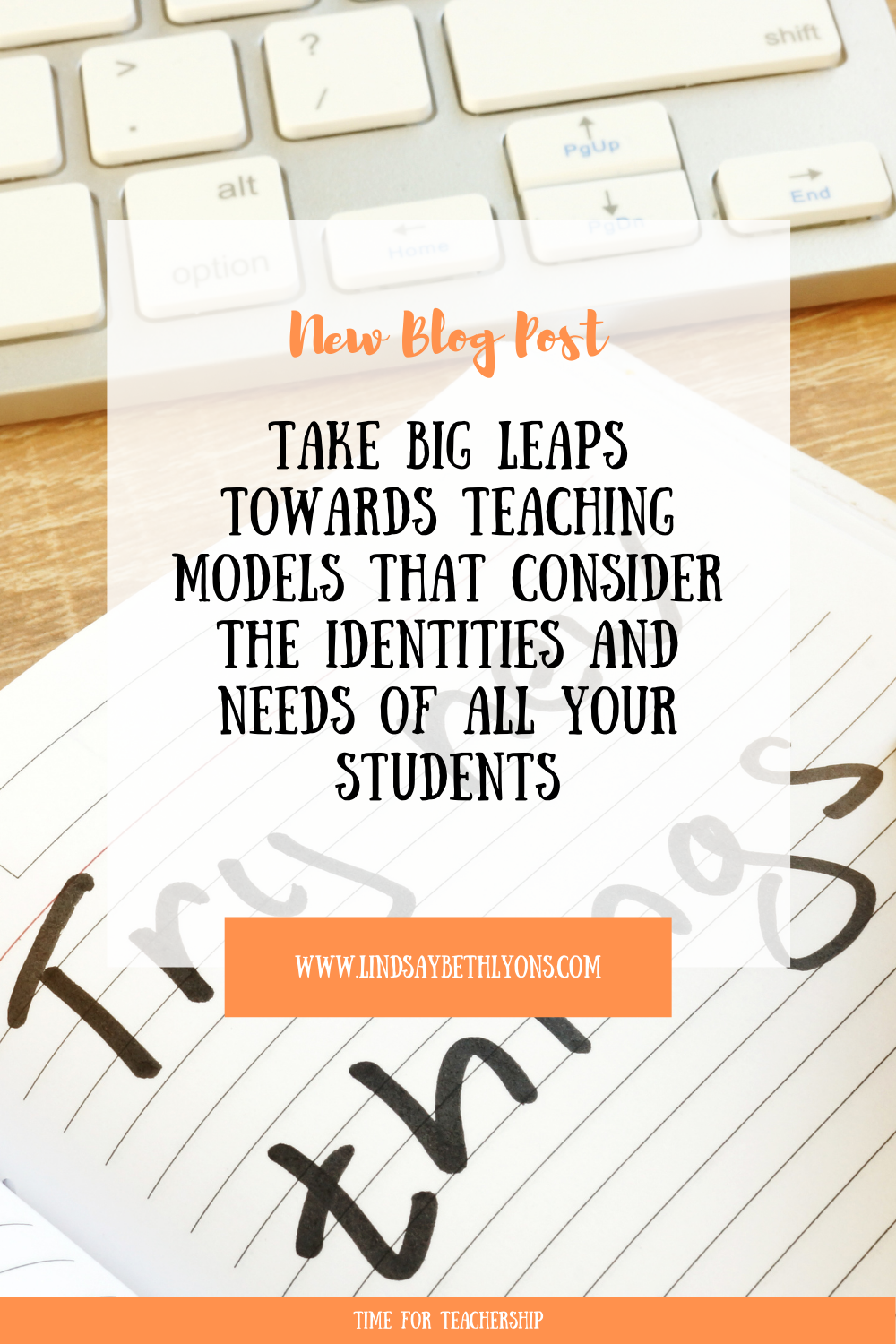
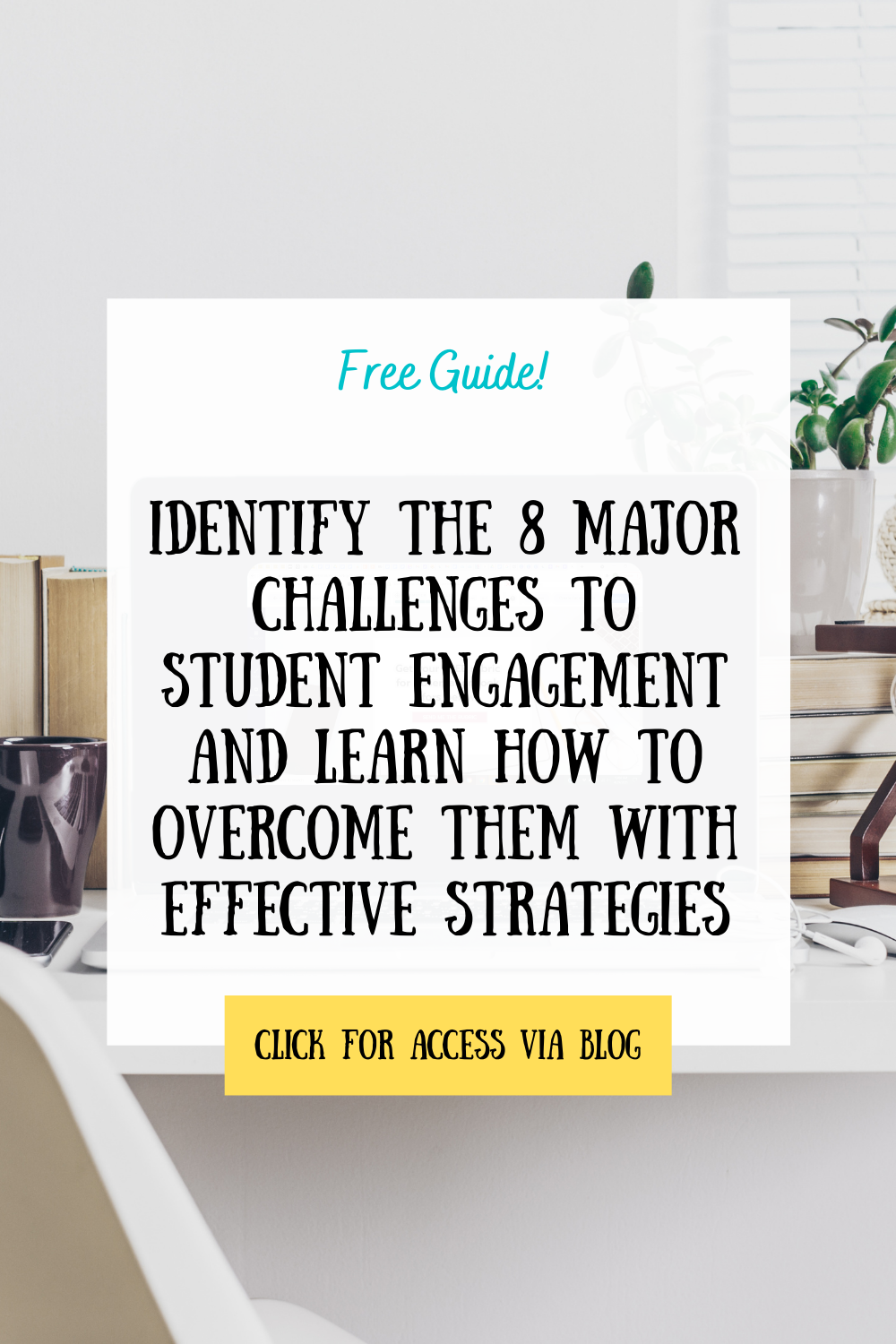
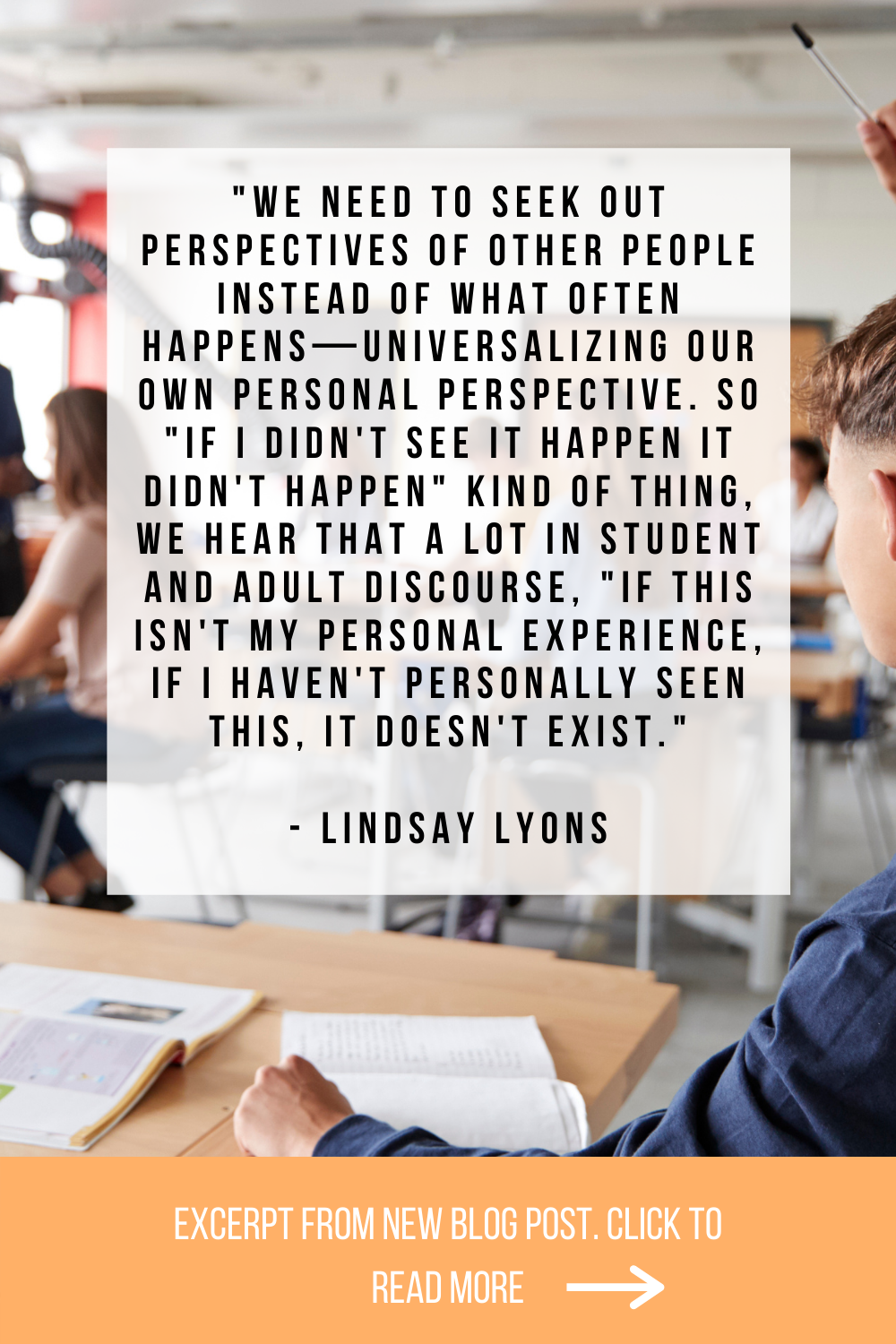
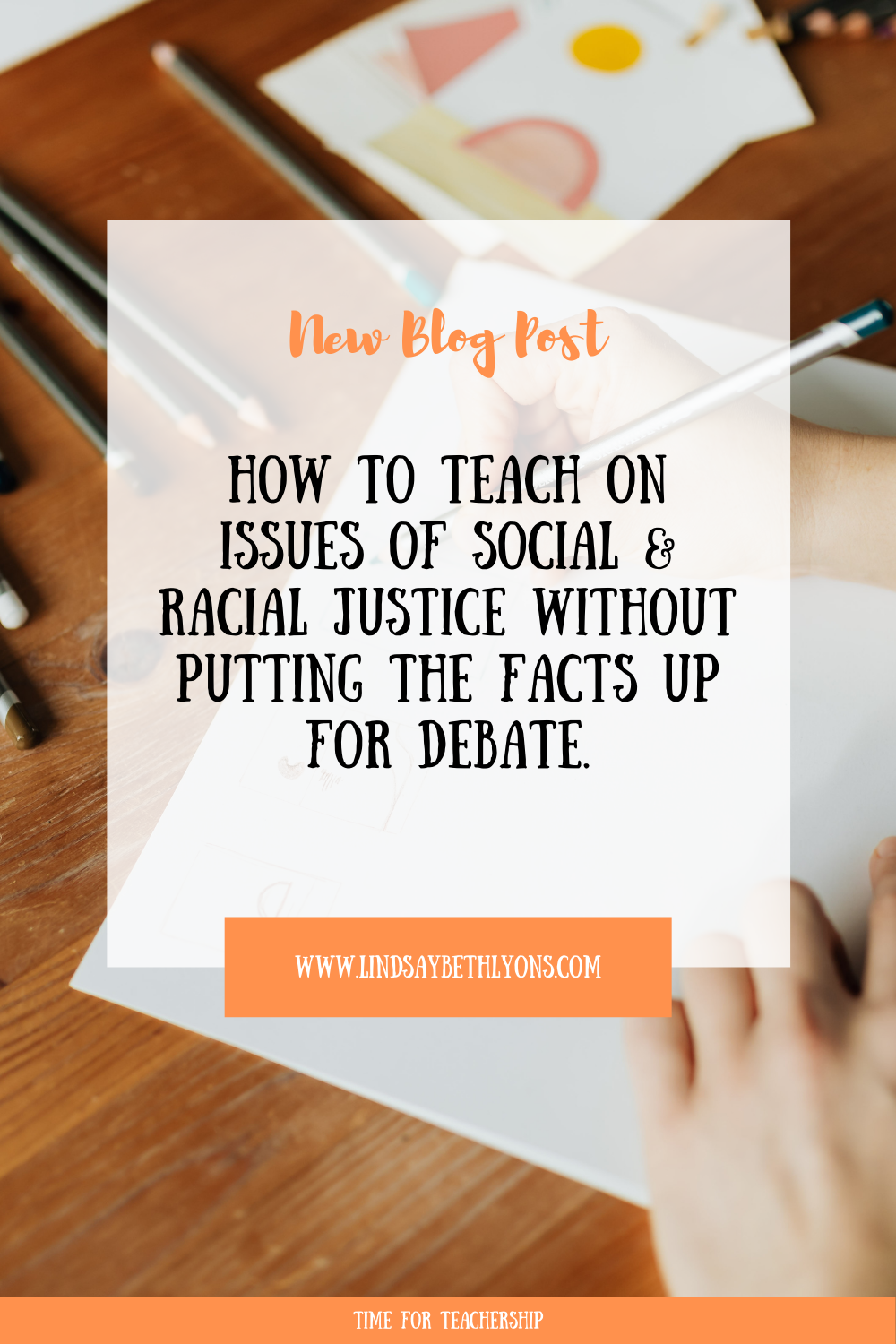
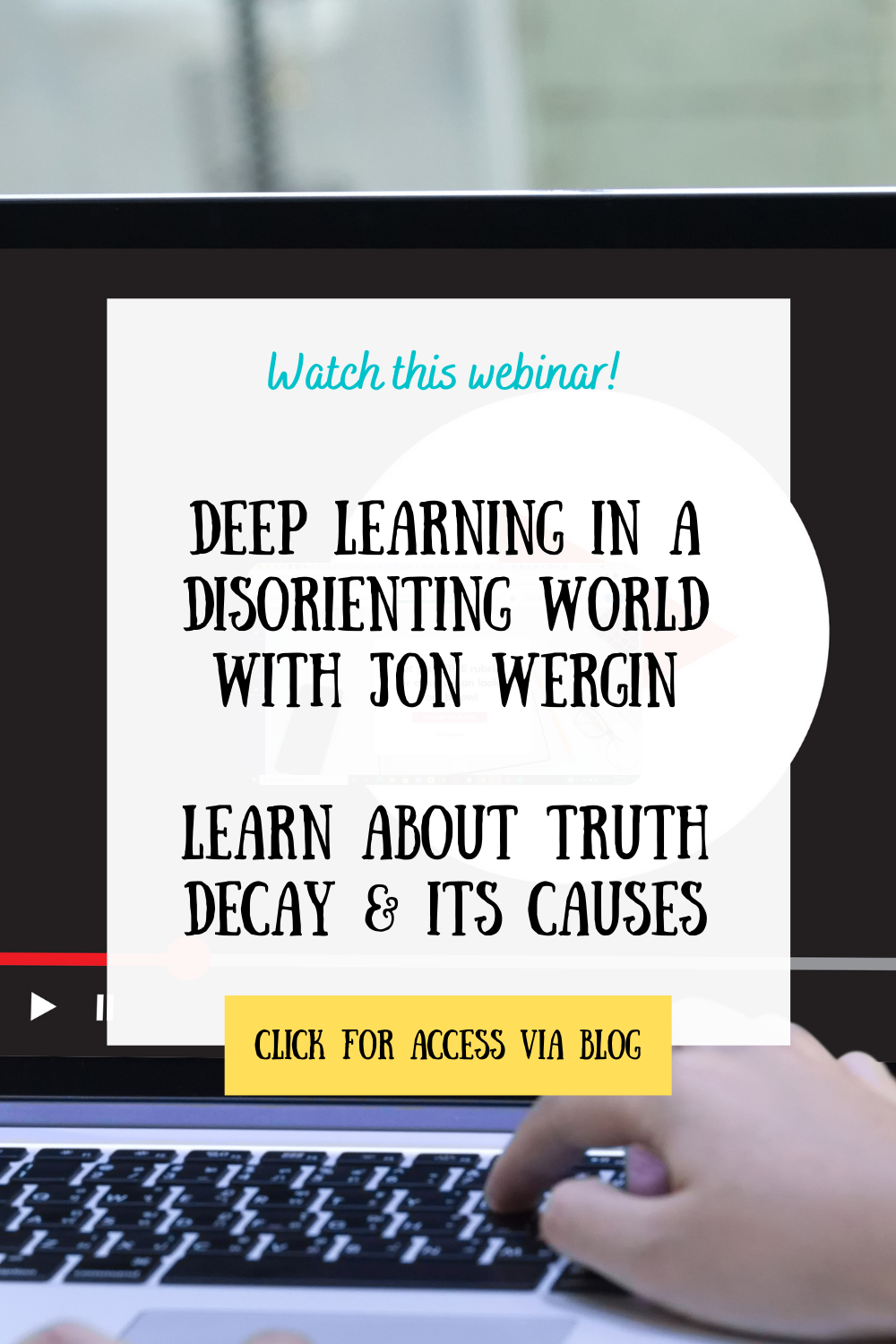
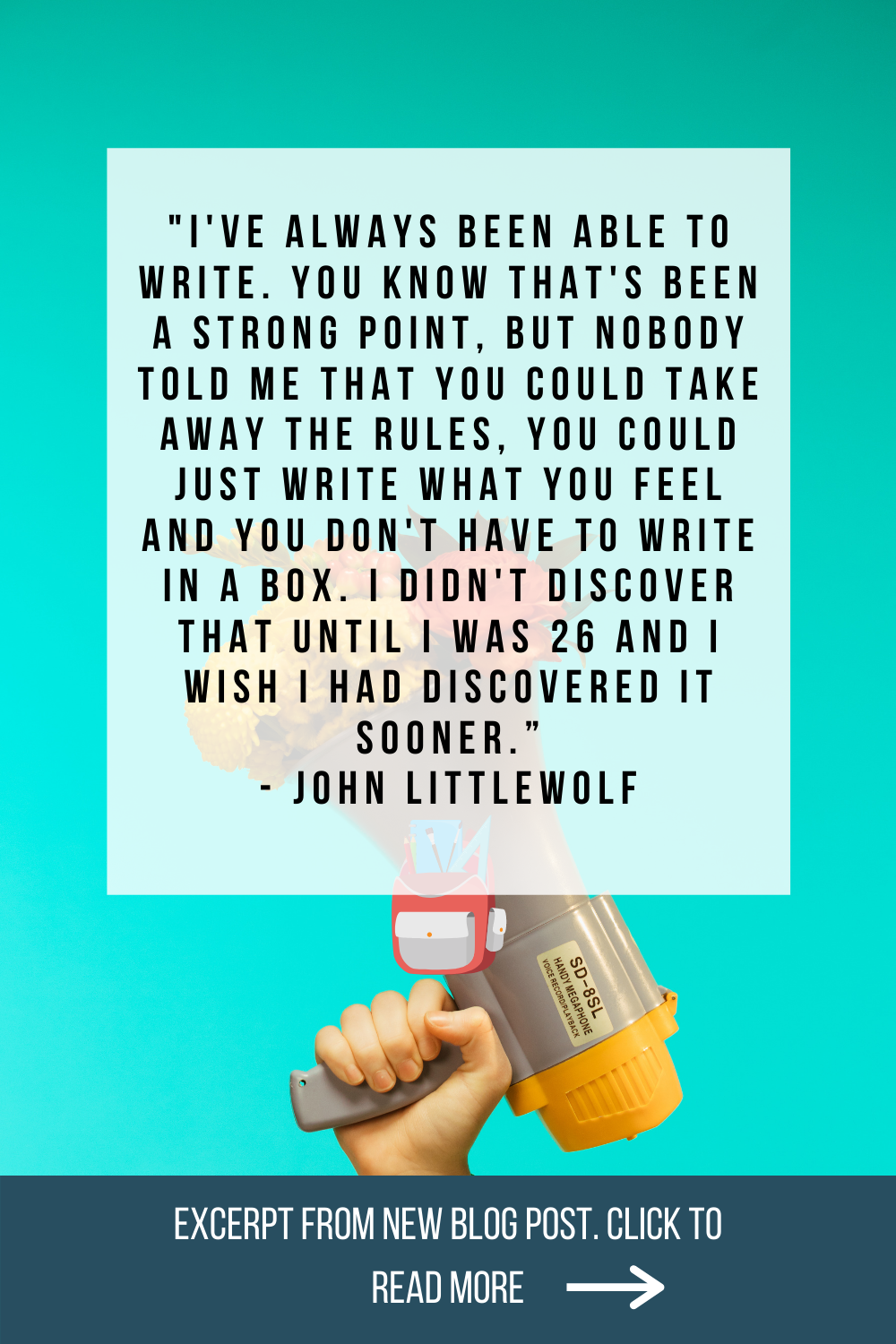
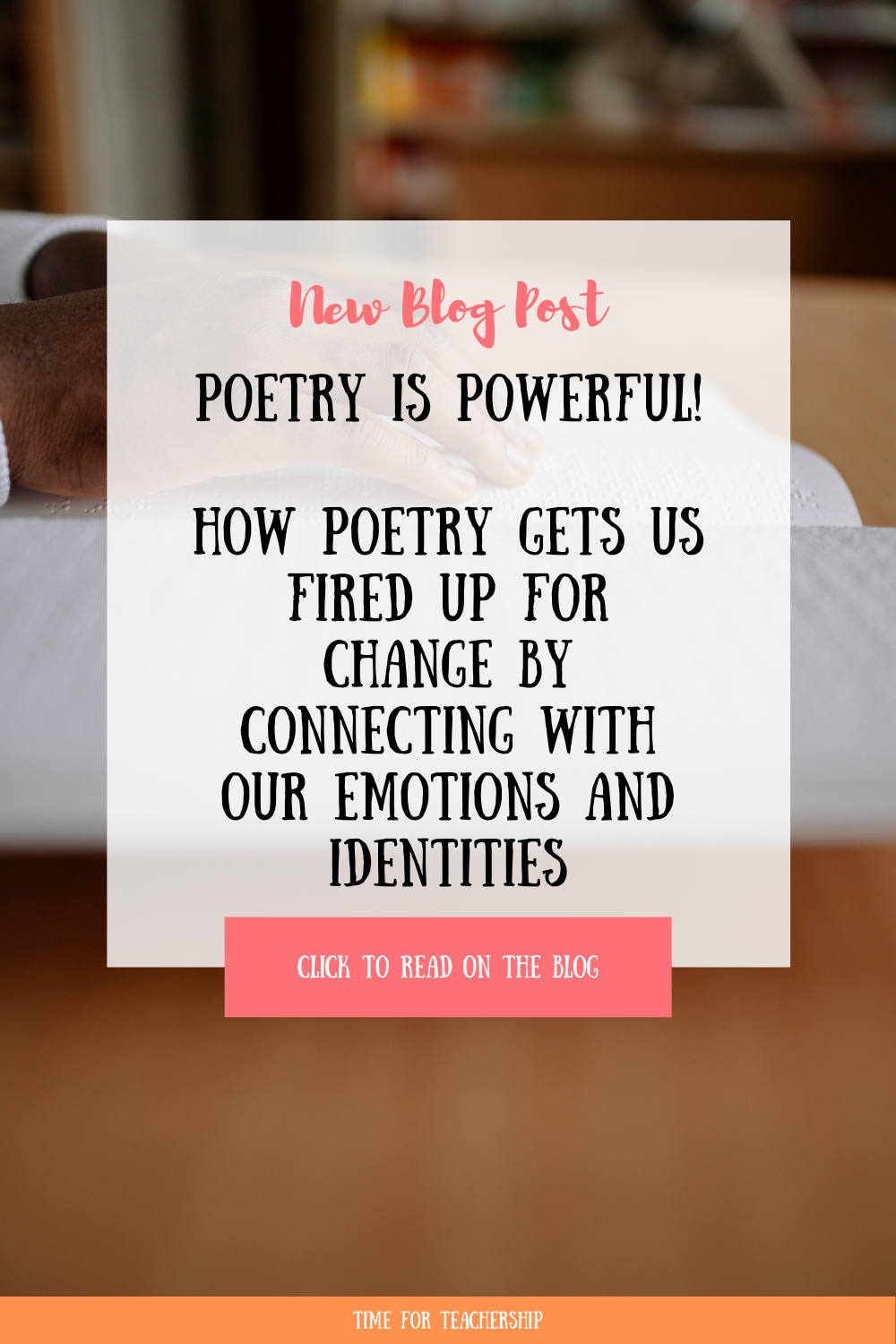
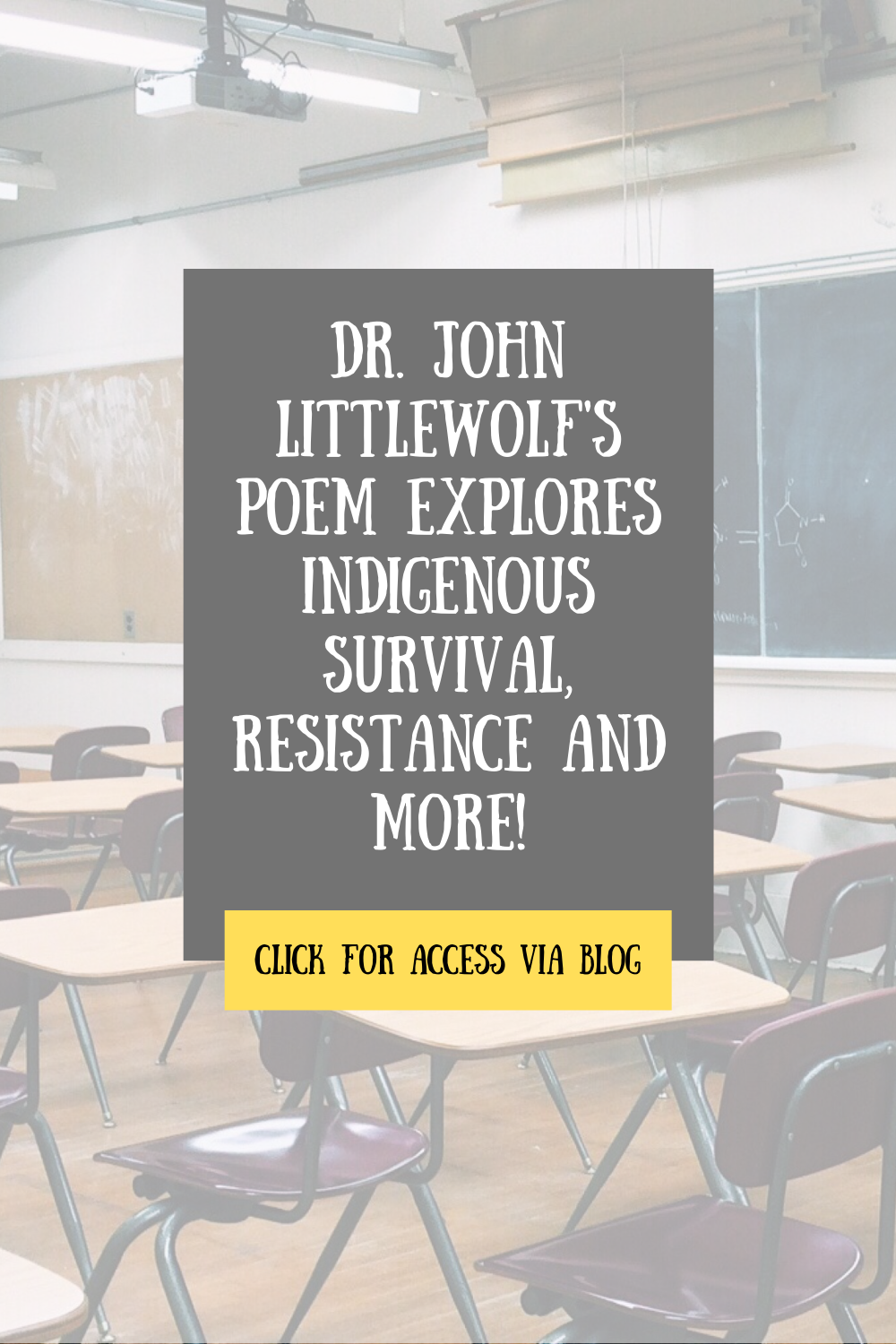
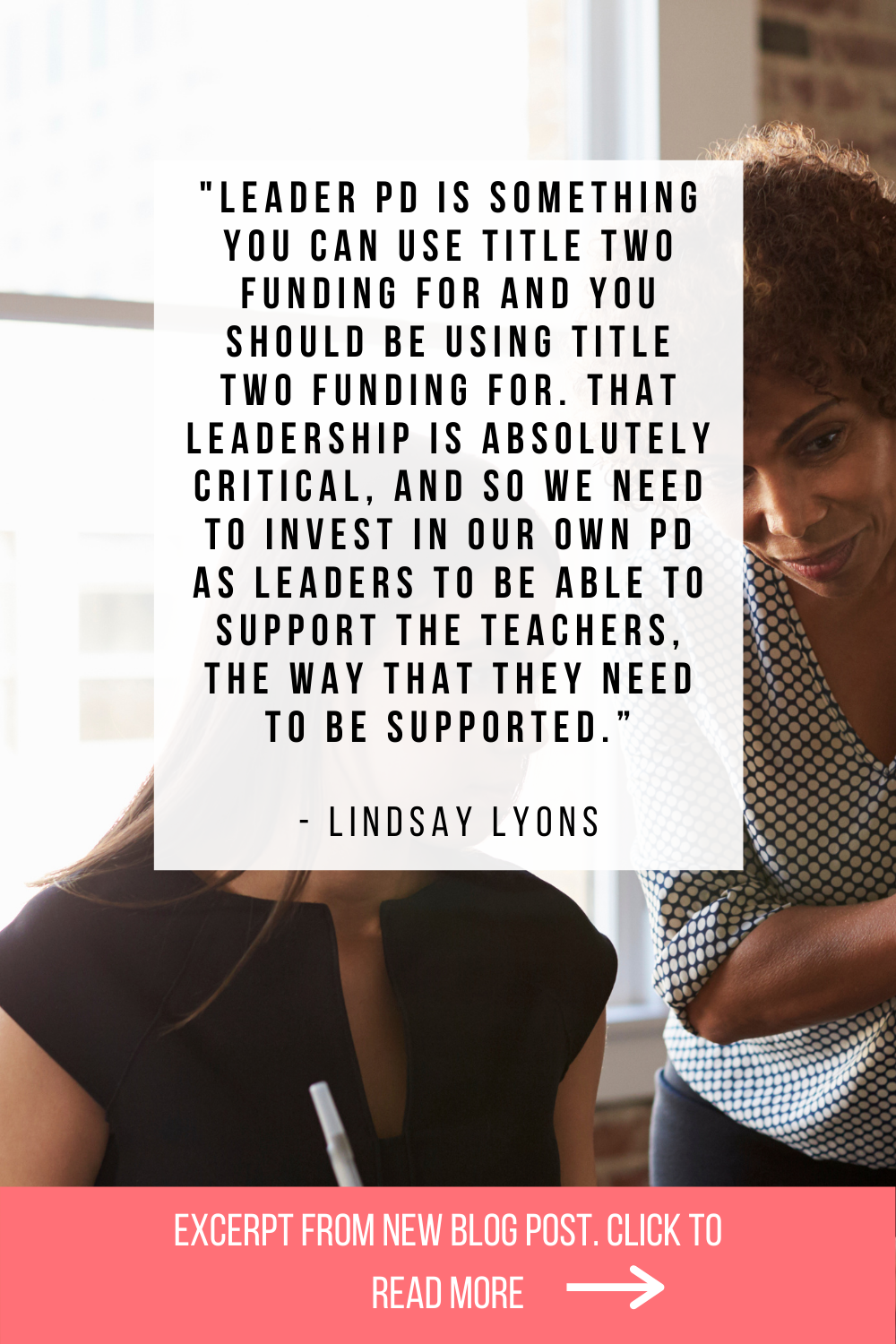
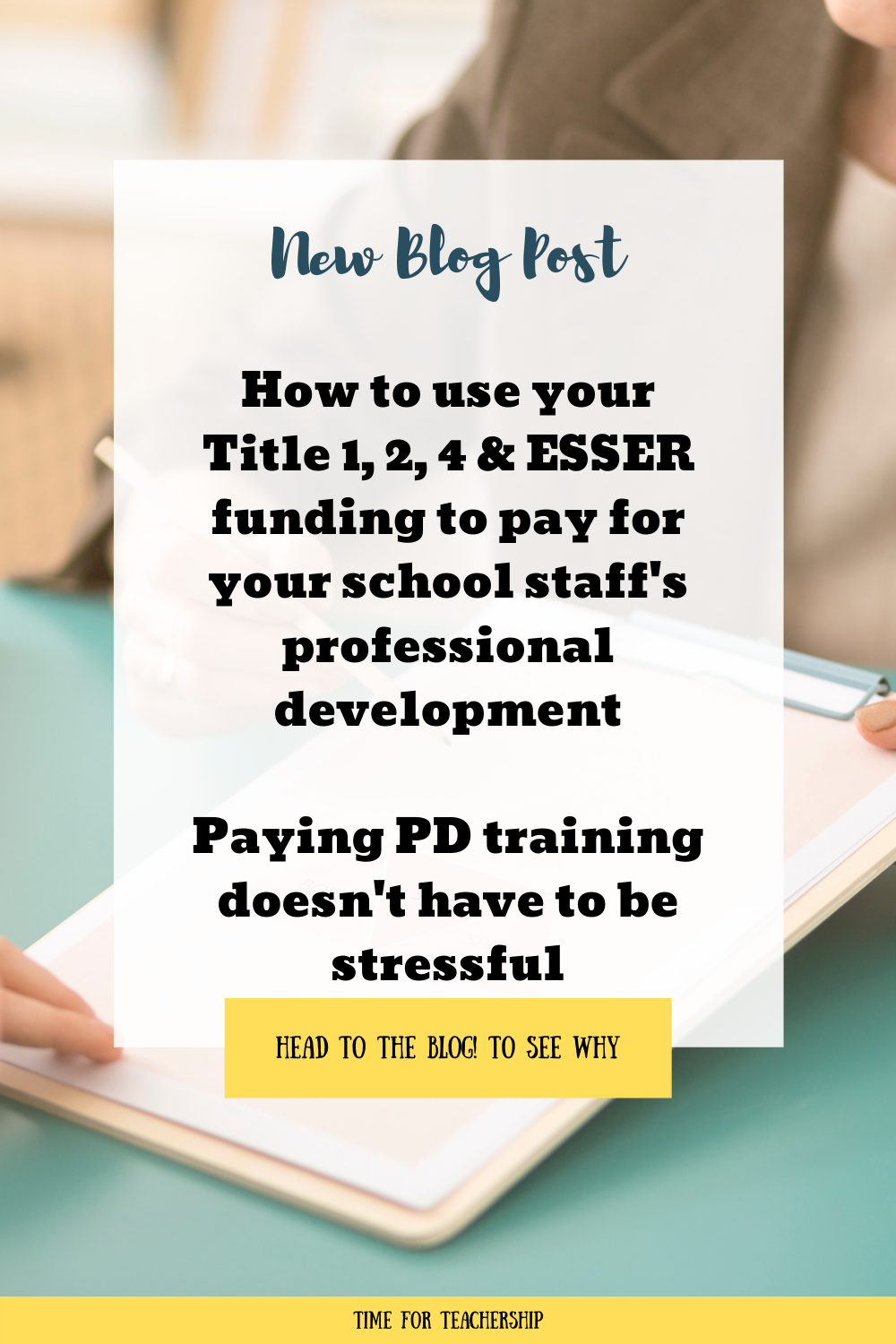


 RSS Feed
RSS Feed